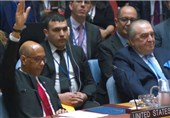Lockdown Shockwaves Rock Europe As Protesters Bring Violence to Streets
TEHRAN (Tasnim) – Protesters have taken to the streets in Spain and Italy again to vent their fury at new coronavirus restrictions as Europe teeters on the brink of a second full lockdown.
Fireworks were thrown into the path of cars in Seville overnight with wheelie bins set on fire before police were called to shut down the demonstrations.
Meanwhile protesters clashed with police on the streets of Rome over lockdowns, marking a fifth straight night of unrest in Italy over the country's COVID response, the Daily Mail reported.
With cases mounting across the continent, Germany's Angela Merkel and France's Emmanuel Macron looked poised to announce 'circuit breaker' lockdowns this week, set to last throughout November.
If confirmed, the move will pile pressure on other European leaders to act. In Spain, one expert conceded that a full lockdown is 'the only thing that has worked' even as more curfews were introduced.
Fears of more shutdowns caused European markets to open sharply down on Wednesday, with the British FTSE 100, German DAX, French CAC and Italian FTSE MIB all opening around 3 per cent lower than at close.
Health experts in Spain have warned that another full lockdown could be on the cards as intensive care units fill up - with eight at risk of 'collapse'.
Hospitals in Aragon, Catalonia and Madrid, Castille and Leon, Navarra, Rioja, and Ceuta are all around 40 per cent full, according to La Vanguardia.
With cases still on the rise in those regions, experts estimate that all beds could be full within the next 20 days.
In Melilla, a Spanish enclave in northern Africa, the situation is dire - with two thirds of beds currently occupied.
That prompted Spanish PM Pedro Sanchez to call for a new state of emergency to be imposed on Monday, putting the framework in place for him to announce local or even national lockdowns at a moment's notice.
He also announced night-time curfews in an attempt to bring cases under control.
But Tomás Cobo, vice president of the Collegiate Medical Organization, told El Pais that full shutdown 'is the only measure for which there is scientific evidence.'
Protests continued into Wednesday in Spain, as taxi drivers gathered in Barcelona, angry that lockdowns have led to a fall in demand.
Similar demonstrations took place in Italy after Prime Minister Giuseppe Conte announced overnight curfews in Rome, Naples and Milan which he said were designed to avoid a second full lockdown.
Macron was due to speak in a televised address to the nation on Wednesday night, with fears of another full lockdown looming.
French media is reporting that the measures being considered would be 'more flexible' than those imposed earlier this year, but did not give more details.
New measures could come into effect from midnight on Thursday.
Meanwhile, Angela Merkel was meeting with regional leaders in Germany on Wednesday, with another full lockdown up for discussion.
It is thought she could announce more restrictions to being on November 4 which would see bars and restaurants closed, with a ban on public gatherings.
Unlike the first lockdown, schools would remain open.
Virtually every major European country has reported a record one-day total of coronavirus cases either in the last 24 hours, or within the last seven days.
Italy hit a record 22,000 cases on Tuesday and Germany a record 15,000.
Spain and Russia both reported a record total earlier this week, while France and the UK hit new highs the week prior.
Even lockdown-free Sweden, whose approach had been praised for avoiding a severe economic downturn, reported a record 5,000 cases on Tuesday.
While increased testing means second wave totals are not comparable to the first wave, the rate at which cases are increasing - along with hospital admissions - is causing panic among European leaders.
On Tuesday, a dozen restaurant owners protested in front of Milan's city hall while as many stadium concession stand owners waved banners at the Lombardy regional headquarters.
'No one has thought of us,' said Giacomo Errico, the Lombardy president of FIVA Commercio representing 6,000 concession stand owners in the northern region, among 40,000 nationwide, that have been out of work since February.
Such peaceful protests have been staged up and down the Italian peninsula, while more violent protests erupting at night, increasingly culminating with vandalism, looting and clashes with police.
Italy's national prosecutor for terrorism and organized crime, Federico Cafiero de Raho, on Tuesday said subversives had infiltrated peaceful protests in the country. He said they included proponents of the extreme right and anarchists on the extreme left.
Investigators have also looked into indications that organized crime groups in the Naples area provoked violence at a peaceful protest.
France has warned of possible new lockdowns, include extending existing curfews, fully keeping residents at home on weekends or all week and closing non-essential businesses.
Since curfews were imposed a couple of weeks ago, French police have issued 14,000 fines, the interior minister said Tuesday.
Doctors are seeing growing pressure on France's emergency services and intensive care wards, where COVID patients now take up more than half of the beds.
In Spain, the Canary Islands was seeking to pass a law demanding that visitors arrive at the popular archipelago off northwest Africa with proof of a negative COVID-19 test.
Russia, which has world's fourth highest tally of 1.5 million confirmed cases, is resisting a second lockdown.
But with cases rising at over 15,000 a day, the health agency ordered all Russians to wear masks in crowded public spaces, including public transport, and in closed spaces like taxis and elevators.
The Czech government has further tightened its regulations, imposing a nationwide curfew between 9 p.m and 6 a.m. that started Wednesday.
It previously limited free movement, closed stores, schools and restaurants, made it mandatory to wear face masks indoors and outdoors and banned sport competitions, but the number of infections has continued to rise.
Several demonstrations against the virus restrictions were planned for Wednesday in the capital of Prague.
Even Sweden, which avoided a national lockdown and generally imposed far lighter measures than other European countries, is now urging people to avoid shopping centers and shops and stay away from public transportation.
The World Health Organization said more than 2 million confirmed coronavirus cases were reported last week - the shortest time ever for such an exponential increase.
It said for the second consecutive week, the European region accounted for the biggest proportion of new cases, with more than 1.3 million cases or about 46% of the worldwide total.
The UN health agency said deaths were also on the rise in Europe, with about a 35 per cent spike since the previous week.
Overall, Europe has seen more than 250,000 virus-related deaths, according to a tally by Johns Hopkins University. The WHO noted hospitalizations and ICU occupancy due to COVID increased in 21 European countries.






